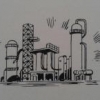Hi there, does anybody know the mixing time of caustic soda (NaOH) with water at 25C, total mass is 1782.358 kg solution should be 40 %, and relative temperature change?.Initially i have 712.943kg NaOH at 20 C and 1096.415kg water at 20 C.
|
|
Mixing Time Of Caustic Soda With Water And Temperature Change
#1

Posted 02 April 2015 - 07:21 AM
#2

Posted 02 April 2015 - 07:38 AM
Consider this document and be cautious with the mixing !
Good luck
Breizh
#3

Posted 02 April 2015 - 07:52 AM
Breizh thank you for you reply, unfortunately there is no answer which i look for, namely time of mixing and temperature change during mixing pure material
#4

Posted 02 April 2015 - 07:58 AM
Define what you mean by "mixing time". 90% homogeneous? 95%? 99% 99.999? It makes a difference.
And, don't say 100%. The answer is infinite time.
Edited by latexman, 02 April 2015 - 07:59 AM.
#5

Posted 02 April 2015 - 08:56 AM
Is there a need to know the mixing time?
If you have a sufficiently powerful stirring mechanism, why would there be a need to know the exact time? If you really needed to know in detail the mixing dynamics, (typically that would be for research purposes) that would be a problem best done in CFD like Fluent or Comsol. Otherwise, there are good correlations you can easily search for to design a suitable stirrer, whether it is turbulent flow or laminar, the type of impeller and number of blades, baffle factors etc.
My advice, don't do unnecessary calculations for the sake of doing it. Temporal equations are always complicated PDE's. Ask yourself on the need to do it.
Attached Files
Edited by thorium90, 02 April 2015 - 01:42 PM.
#6

Posted 02 April 2015 - 09:49 AM
Are you starting with prills or 50% solution?
Details, details, details . . .
#7

Posted 02 April 2015 - 11:51 AM
starting with solid caustic flakes and process water,final solution is assumed to be 100% homegeneous(99-95%).I need to know cause my process should be continuous if it takes long period of time then 2-3 mixer or storage tank should be installed
#8

Posted 02 April 2015 - 12:44 PM
Dear Tarlan94,
Your problem is related with mass transfer, you can review the textbook "Principles of Mass Transfer and Separation Processes" by Dutta B., p. 89, example 3.4.
The basic reference is the paper of Barker J., and Treybal R., "Mass transfer coefficients for solids suspended in agitated liquids", AICHE Journal, 1960, 6(2), but I send you a similar work.
I hope help you. You need define various parameters then you have a integral for the time determination.
Regards,
Napo.
Attached Files
#9

Posted 02 April 2015 - 06:50 PM
Probabaly good to read and have it always in mind .
"keep the control" !
Breizh
#10

Posted 09 April 2015 - 03:33 AM
If you start with 50% caustic & 20 C water I recall that the adiabatic rise gives a final Temp. less than 100 C. Around 80 C I think. I could be wrong.
With flakes I don't know.
Edited by curious_cat, 09 April 2015 - 07:30 AM.
#11

Posted 09 April 2015 - 07:10 AM
curious _cat,
I recommend you review Dow's Caustic Soda Solution Handbook. Breizh provided it above in post # 2. It depends on the ratio of caustic to water, but the maximum temperature is about 50 C at 31% caustic, starting with 50% caustic and water at 20 C (Figure 4).
#12

Posted 09 April 2015 - 07:29 AM
curious _cat,
I recommend you review Dow's Caustic Soda Solution Handbook. Breizh provided it above in post # 2. It depends on the ratio of caustic to water, but the maximum temperature is about 50 C at 31% caustic, starting with 50% caustic and water at 20 C (Figure 4).
@latexman
Thanks. You are right. I was mistaken.
Similar Topics
Water Hammer Study: Hysys Dynamics Vs PipenetStarted by Guest_powerox29_* , 07 Apr 2025 |
|

|
||
Steam Carrying Liquid From The Sour Water Stripping TowerStarted by Guest_kaidlut_* , 12 Sep 2024 |
|

|
||
Water TreatmentStarted by Guest_not_mikhail_* , 01 Apr 2025 |
|

|
||
Tank Filing TimeStarted by Guest_not_mikhail_* , 17 Mar 2025 |
|

|
||
Cross Over Temperature In Countercurrent Heat ExchangerStarted by Guest_panoska_* , 18 Feb 2025 |
|

|

 FB
FB











